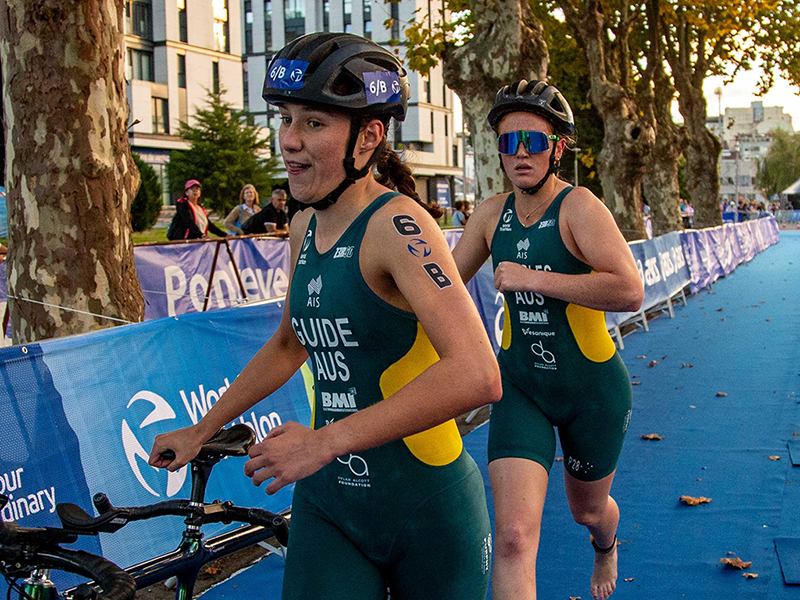This website uses cookies so that we can provide you with the best user experience possible. Cookie information is stored in your browser and performs functions such as recognising you when you return to our website and helping our team to understand which sections of the website you find most interesting and useful.
Stories
Maggie Sandles’ Paralympic dream
Teamwork is powering Maggie Sandles through challenges and towards her dreams of Paralympic gold.
Maggie Sandles, a 22-year-old para‑triathlete, was hoping to compete in the 2024 Paris Paralympics. At the final qualifier Maggie just missed out, but she shrugged off the disappointment.
“My next challenge is the World Championships in Spain,” Maggie says.
“Ultimately the goal is to podium at the 2028 Los Angeles Paralympics. That is my new dream.”
Maggie is as optimistic, determined and driven in sport as she is in life, and Usher syndrome isn’t holding her back. She sees her condition as a remarkable opportunity.
Born with Type 1C Usher Syndrome, the most common genetic form of deaf-blindness, Maggie was profoundly deaf at birth.
Through childhood, she developed balance problems and the gradual onset of retinitis pigmentosa – a condition associated with Usher syndrome.
Retinitis pigmentosa affects the retina, the light-sensitive layer of tissue in the back of the eye. As a result, Maggie has decreasing peripheral vision and trouble seeing any details at night.
While complete blindness is uncommon, Maggie is expecting her sight will continue to deteriorate.
“The diagnosis was hard,” Maggie says.
“Initially, I could only focus on the fact I was going to be blind by the time I was 30. Whilst this isn’t true for everyone, that’s what the ophthalmologist told me.
“My diagnosis was perhaps not delivered gently, but we handled it great as a family. My mum was very supportive, and my dad dove into the research.”
Positive focus
While Maggie is unfailingly positive, she admits daily life can be a struggle. Currently, she has around 15-20 degrees of peripheral vision, compared to a normal 120.
“This means I cannot drive. I am a hyper-independent person, so it’s one of the hardest things about Usher syndrome,” she says.
In sport, Maggie says she found both an outlet for her energy and a coping mechanism.
“Sport was a place where I didn’t feel very different. There was always a bigger challenge, whether it was performance pressure or a hard training session.”
Maggie says obstacles, like not hearing her coach on the megaphone or a wobble climbing onto her bike, were soon forgotten.
“Sport taught me resilience and dedication, which are now integral values in my life.
“While this isn’t how I imagined my life would go, there is a world of opportunities available that weren’t before. I’m travelling the world and aiming for the Paralympics and World Championships. I think that’s pretty cool.”

Better experiences
“Maggie sets an incredible example for young people living with inherited retinal disease,” says Associate Professor Lauren Ayton – a clinician‑scientist at CERA with a strong research interest in inherited retinal diseases (IRDs), gene therapy and clinical trials.
“But even she admits that life with Usher syndrome is not what she expected.
“Although there’s currently no treatment for Usher syndrome, breakthroughs have put many treatments for previously untreatable conditions in reach.”
Gene therapy, stem cell research and regenerative medicine offer avenues for repairing damaged sensory cells – potentially restoring or improving hearing and vision.
“CERA’s Genetic Engineering Research Unit is working on a treatment to prevent vision loss from Usher syndrome,” Associate Professor Ayton says.
“And the work of myself, Dr Tom Edwards and our team is focused on clinical trials as a tool to improve awareness, support networks and advocacy efforts for people living with Usher syndrome.
“This is vital to improving access to resources, funding research initiatives and enhancing the quality of life for individuals and families affected by Usher syndrome.
“Our ultimate goal is seeing a world where all people with complex conditions such as Usher syndrome receive best-practice multidisciplinary care.”
Bigger dreams
Maggie says she hopes to be a role model to “inspire others with Usher syndrome to dream big”.
“I want to go to more than one Paralympic Games and see the world as much as I can before my sight deteriorates. I hope for driverless cars. I hope for research breakthroughs that lead to effective treatments and, ultimately, a cure.
“Inherited retinal diseases affect millions worldwide, causing vision loss and impacting quality of life.
“The incredible work by CERA researchers using stem cell technology and gene‑editing techniques offers a beacon of hope for those of us living with conditions like Usher syndrome.”
Follow Maggie’s journey on Instagram: @maggie_sandles

